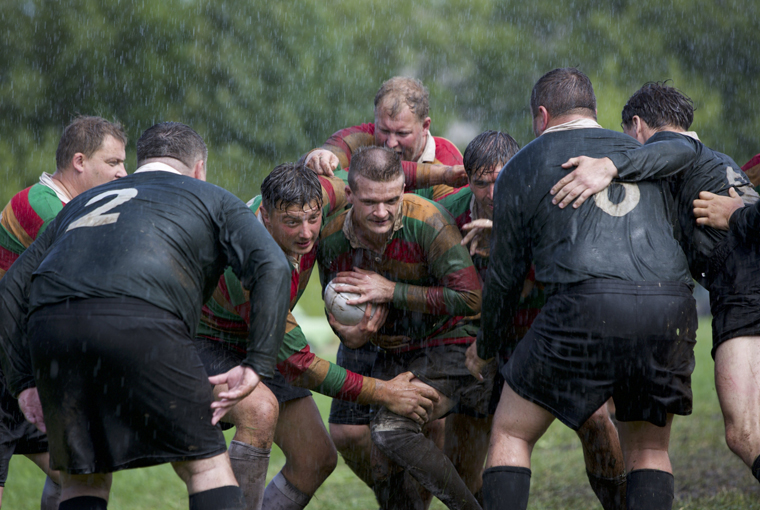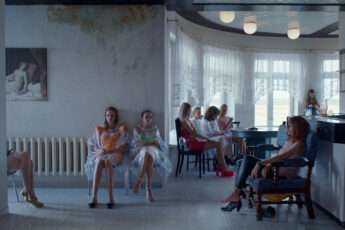“You Think Being Simple Is So Simple?”
Ignas Miškinis’ Southern Chronicles (Pietinia kronikas, 2024)
Vol. 157 (September 2025) by Jack Page
Seventeen-year-old Rimants is approaching his final year at school and is struggling to find purpose. Juggling girlfriends, low-wage jobs and rugby practice, Rimants soon finds himself questioning what a good time really is. Set in the Lithuanian city of Šiauliai, Southern Chronicles is an authentic and accurate depiction of the highs and lows of young adulthood during the early nineties. Between the regional dialect with its colloquial dialogue/slang and the nineties home video aesthetic, the film acts as an honest and endearing love letter to a very specific and pivotal moment in the country’s history.
Charmingly portrayed as rugged yet with a sensitive side, Džiugas Grinys’ boyish protagonist is the identifiable lead of the film. From falling in love, losing his virginity, his first heartbreak, and fearing what the future might hold after graduation, Rimants’ teenage experience is like any other. He is constantly embarrassed, dissatisfied, and indecisive. But his character is also relatable in a contextual sense. Rimants is representative of the typical working-class Lithuanian after the country’s end of Soviet rule. Shortly after being given their independence, many citizens experienced a dark period of poverty and unemployment, particularly in the smaller cities. For Rimants, the very lack of opportunity in his home town is the cause of his lackluster ambition and misguided aspiration in dealings on the black market. When dating Monika (Digna Kulionytė), they daydream of escaping to the country’s capital Vilnius or Klaipeda where they expect there may be better circumstances for work. Importantly, the disparate relationship between Monika and Rimants stems from their class divide. As Monika’s parents are doctors and they live on the more affluent side of town, her culture is shaped by highbrow literature, classical music, and the arts. Rimants on the other hand, prefers to attend punk rock gigs and play rugby, but that doesn’t mean he lacks the intellectual capacity to appreciate Monika’s teachings, often renting Dostoyevsky at the local library to impress her and educate himself. To his own surprise, he finds as much enjoyment in books and poetry as he does on the rugby playing field. Inevitably, like all frustrated teenagers, Rimants falls out of love with all his interests as often as the weather changes. He is flippant when it comes to belonging, switching between rebellious independence and the comfort of his friendship circle. Having a foot in both camps, Rimants can’t decide if he wants both or neither, to be like everybody else or just himself.
Rimants experiences numerous comedic and humbling moments where his voice-over narration acts as an inner monologue while the events unfold. His undefeated rugby team is trounced by Zalgaris, the visiting team from the capital Kaunas. He quickly realizes that his team’s previous success owes itself to the fact it had only been playing in the local league, never having faced an opponent from another major city. They had, for a short while, been big fish in a small pond. He also intentionally flunks a literature entrance exam. It isn’t the texts he struggles to comprehend, but the idea of higher education in general. If his peers spend three or more years in the same halls and classrooms, only to find work as a shop assistant or nightclub security guard (menial jobs he himself found that year), what is the point? Upon striking out with his crush, Rimants even likens flirting and having sex to the rules of rugby, stating: “The smallest gap is still a gap.” Although his pearls of wisdom are rarely optimistic, Rimants’ witty and juvenile commentary lends a likability that ceases to dwindle, even when he makes some questionable life decisions. If one could argue that since the film is so firmly positioned in the comedy genre that the stakes are never very high for the main protagonist, I choose to believe that this style is in keeping with the wry, self-effacing tone of Southern Chronicles. Rimants is quick to find the irony in his skill for rugby, which if it had been the Lithuanian national sport of basketball, he may have made something of himself by now. It is these kinds of digressions and quips that are addressed directly to the spectator, proving the film’s creative self-awareness while avoiding any pretentious techniques that would not be in keeping with its overall tone.
Shot like a 1990s music video, the visuals of the film further enhance the narrative’s sense of nostalgia. There is a refreshing absence of modern technology and the retro costume design seems (for today) so old-fashioned that the look of Southern Chronicles is almost counterculture in itself. There is no email or mobile phone, only physical house calls, throwing rocks at windows, landline telephone conversations, and handwritten love letters. Music is blared from hi-fi towers and Walkman cassette tapes. The school girls wear baggy patchwork shirts, faded denim, and large hoop earrings. The boys are clad in oversized fake leather jackets, Adidas tracksuits, and ill-fitting jeans. They seem to sport only two types of haircuts: the crew cut or the shaved head. The mise-en-scene of domestic interiors is laden with loud patterned upholstery and wholly cardigans. These images offer a personal sense of realism, as if the aesthetic has been based on someone’s old family photographs from house parties held in their apartments thirty years ago. Nevertheless, Southern Chronicles not only looks timeless, its characters and themes are of the utmost universality. Despite the filmmaker’s simplistic execution of the narrative, the film refuses to compromise on the complicated feelings it may incite and the complex reactions garnered by the audience.




Leave a Comment